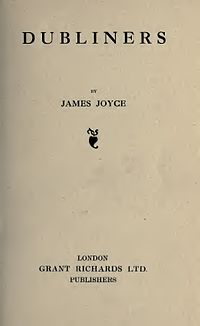 Title page of the first edition in 1914 of Dubliners | |
| Author | James Joyce |
|---|---|
| Language | English |
| Genre | Short story collection |
| Publisher | Grant Richards Ltd., London |
Publication date | June 1914 |
| Pages | 152 |
| OCLC | 23211235 |
| 823/.912 20 | |
| LC Class | PR6019.O9 D8 1991 |
| Text | Dubliners at Wikisource |
Dubliners is a collection of fifteen short stories by James Joyce, first published in 1914.[1] It presents a naturalistic depiction of Irish middle class life in and around Dublin in the early years of the 20th century.
The stories were written when Irish nationalism was at its peak, and a search for a national identity and purpose was raging; at a crossroads of history and culture, Ireland was jolted by various converging ideas and influences. Joyce felt Irish nationalism, like Catholicism and British rule of Ireland, was responsible for a collective paralysis.[2] He conceived of Dubliners as a "nicely polished looking-glass"[3] held up to the Irish and a "first step towards [their] spiritual liberation".[4]
Joyce's concept of epiphany[5] is exemplified in the moment a character experiences self-understanding or illumination. The first three stories in the collection are narrated by child protagonists, while the subsequent stories are written in the third person and deal with the lives and concerns of progressively older people, in line with Joyce's division of the collection into "childhood, adolescence, maturity, and public life".[6] Many of the characters in Dubliners later appeared in minor roles in Joyce's novel Ulysses.[7]
- ^ Osteen, Mark (22 June 1995). "A Splendid Bazaar: The Shopper Guide to the New Dubliners". Studies in Short Fiction.
- ^ Curran, C. P. (1968). James Joyce Remembered. New York and London: Oxford University Press. p. 49. ISBN 0192111795. Retrieved 16 February 2024.
I call the series Dubliners to betray the soul of that hemiplegia or paralysis which many consider a city.
- ^ Gilbert, Stuart (1957). Letters of James Joyce. New York: The Viking Press. pp. 63–64. Retrieved 21 February 2024.
It is not my fault that the odour of ashpits and old weeds and offal hangs round my stories. I seriously believe that you will retard the course of civilization in Ireland by preventing the Irish people from having one good look at themselves in my nicely polished looking-glass.
- ^ Gilbert 1957, pp. 62–63: I believe that in composing my chapter of moral history in exactly the way I have composed it I have taken the first step towards the spiritual liberation in my country
- ^ Joyce, James. Stephen Hero. London: Jonathan Cape. p. 216. Retrieved 1 March 2024.
By an epiphany he meant a sudden spiritual manifestation, whether in the vulgarity of speech or of gesture or in a memorable phase of the mind itself.
- ^ Ellmann, Richard (1966). Letters of James Joyce Volume II. London: Faber and Faber. p. 134. Retrieved 16 February 2024.
- ^ Michael Groden. "Notes on James Joyce's Ulysses". The University of Western Ontario. Archived from the original on 1 November 2005.